Intermarkets' Privacy Policy
Donate to Ace of Spades HQ!
aceofspadeshq at gee mail.com
Buck:
buck.throckmorton at protonmail.com
CBD:
cbd at cutjibnewsletter.com
joe mannix:
mannix2024 at proton.me
MisHum:
petmorons at gee mail.com
J.J. Sefton:
sefton at cutjibnewsletter.com
Hobby Thread - February 28, 2026 [TRex]
Ace of Spades Pet Thread, February 28
Nazis, RINOs, Islamofascists, and Other Infiltrators Who Should Have Been Purged Long Ago Are Having a Bad Day
Gardening, Home and Nature Thread, Feb. 28
Reactions: All the Right Nazis and Islamic Apologists Is Losing Dey Shit
REPORTS: THE AYATOLLAH HAS BEEN KILLED
The Classical Saturday Morning Coffee Break & Prayer Revival
The US and Israel Have Launched Military Strikes to Take out the Iranian Government
Daily Tech News 28 February 2026
Jim Sunk New Dawn 2025
Jewells45 2025
Bandersnatch 2024
GnuBreed 2024
Captain Hate 2023
moon_over_vermont 2023
westminsterdogshow 2023
Ann Wilson(Empire1) 2022
Dave In Texas 2022
Jesse in D.C. 2022
OregonMuse 2022
redc1c4 2021
Tami 2021
Chavez the Hugo 2020
Ibguy 2020
Rickl 2019
Joffen 2014
maildrop62 at proton dot me
Saturday Gardening Thread, The Garden Retreat [KT]
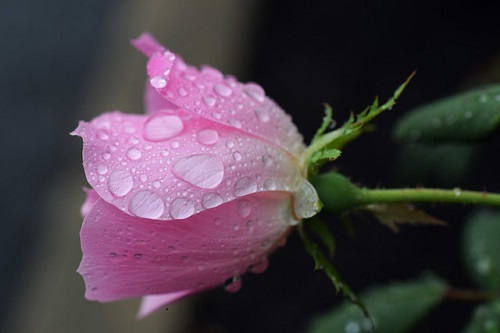
The lovely photo above was taken by Crisis du jour. June is known as a good month for roses. But today, we are featuring a garden retreat made possible partly by vining plants. Plus some interesting critters and other photos and information from The Horde. We do have some roses for next week. If you have more, send 'em on in.
Critters
From Illiniwek:
4 babies on my porch, they flew that day.?? Maybe some kind of flycatcher?
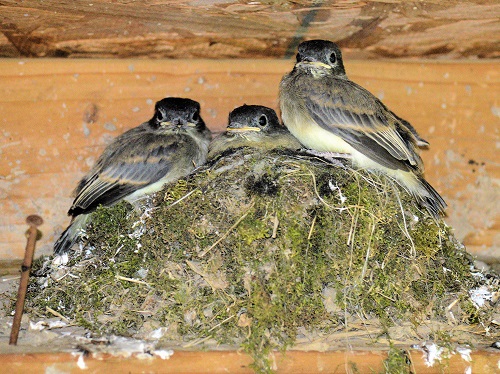
How fun is that?
Via Hank Curmudgeon, the strange Acorn Woodpecker and what it does to a tree.
The acorn woodpecker's main food source is insects, but acorns and tree sap serve as key nutritional backup. Acorns are a critical resource, allowing the birds to make it through the winter. They live year-round in the same mild, Mediterranean climate, which gets wet but doesn't necessarily freeze in winter; if they simply stored their acorns in piles, the nuts would mold and rot. Instead, they need a place where the nuts will dry out.The granaries are labor-intensive in both their construction and upkeep: the woodpeckers drill holes sections at a time to lodge the individual acorns, but as acorns dry, they shrink--meaning that one of their major activities during the winter is moving the acorns into better-fitting holes within the granary. A robust acorn crop can even get the birds through until fall.
One of the strangest traits of the acorn woodpecker, however, is its collective behavior -- in both food storage and childrearing. Family groups, says Koenig, vary from a single pair of birds all the way up to a group of as many as 14 or 15.
Lots of amazing tree photos at the link. But we have a photo of the bird from ByTor, taken on a photo excursion to some nature retreats with his brother in Southern California.
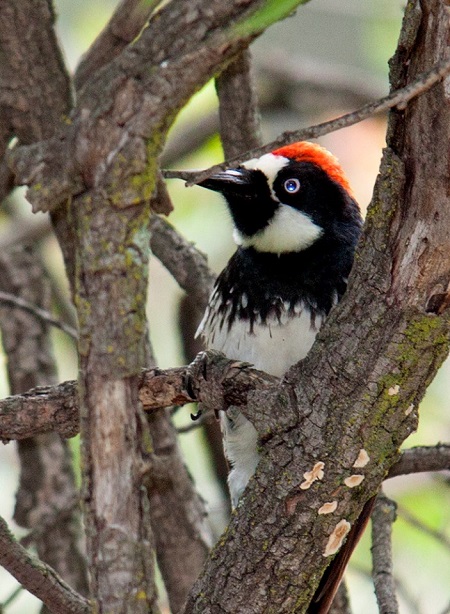
You can get more information about this bird species here. They call it "clown-faced". "Granary trees" may be riddled with as many as 50,000 holes.
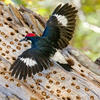
Shows some similarities to Jake Holenhead's Downy Woodpecker here. But some definite differences, too.
By the way, here's a close-up of his bumblebee photo posted that day:
So fuzzy. Not like the hoverfly below. Does this make you want to pet one?
The photo below is by Illiniwek. The insect is perched on a Coreopsis which I think is part of his Deer Resistant Meadow, which he reports came up almost weed-free. The I.D. is by Hank Curmudgeon.
Hover fly. Specifically, I'm thinking, The key to this ID was the shape of the antenna between the eyes, just short nubs, typical of flies and the eye shape and position, again typical for flies. Look at both and compare. Honey Bee. A fly's eye position is one of the reasons they are so hard to sneak up on and swat. The bee has a stinger, is beneficial to almost every other creature in the ecosystem, is busy working and has a warning pattern to it's coloration thus allowing it's two large main compound eyes to be focused on work and not watching it's back.
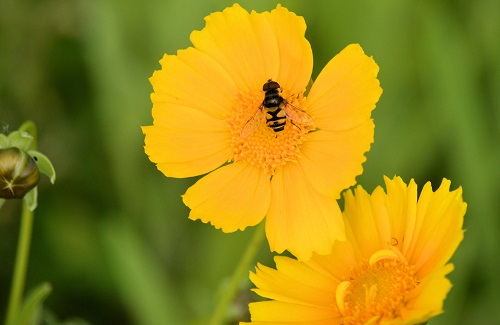
I think this is a honeybee. Photo is by By-Tor. Flower is a Lantana.
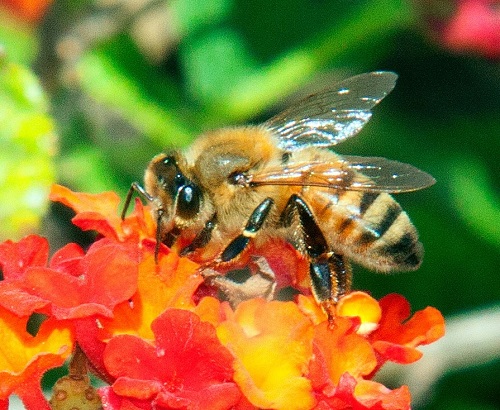
Hank Curmudgeon sent in an interesting article on efforts to save the bees, focusing on the need for various types of pollen. Interesting. I think Illiniwek is doing his part.
Carnivorous Plants
From Tony Litwin, a couple of Pitcher Plants
Sarracenia Oreophila ornata
S. OREOPH.jpg)
This one is special:
I took a Sarracenia Oreophila pollen and pollinated the stamens to a Sarracenia Leucophylla Gulf Breeze and got the hybrid 'Marilyns Blush' named for my wife.
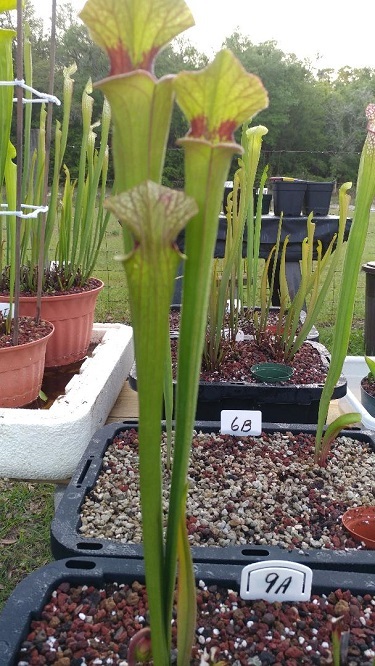
And from Average Guy's greenhouse, a Drosera (Sundew) in front of a Bromeliad. I don't know if it is one that "the experts" would consider to be carnivorous. Looks nice, though.
He called the Sundew "big". I think that is a relative term, compared, to the pitcher plants above.
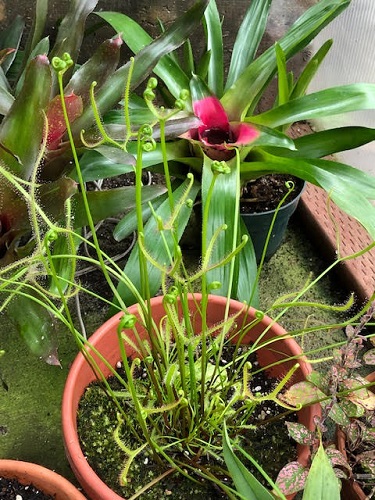
Mandevillas or Dipladenias
Last year about this time, Bonecrusher sent in a nice photo of a pink Mandevilla vine from his home near Houston.
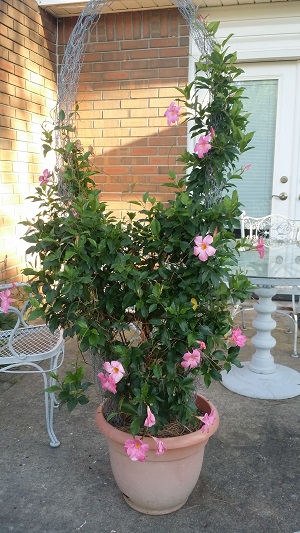
Then we got this note:
I managed to kill the Mandevilla during the hellish heat last summer. The red flowers appear to be climbers, so I'm going to try again.
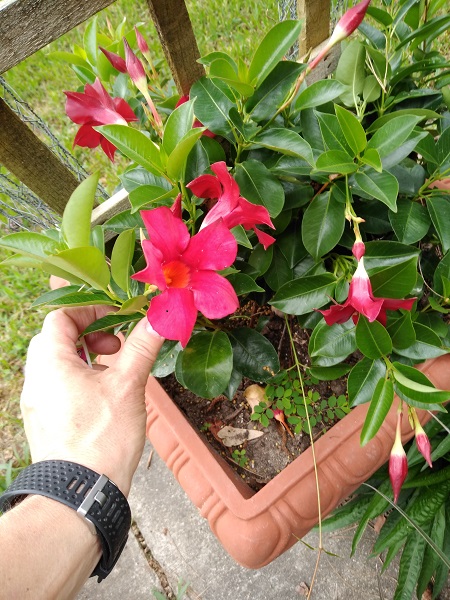
He sent along a photo of the tag, which indicates that this plant is Dipladenia 'Rio Red'. Here's a rundown on this series from the breeder. Sorry, it's a short one, Bonecrusher. Not a climber.
Grows 30 to 60cm (12" to 24") in height.
Doesn't mean you can't find a climbing one, though. Bonecrusher sent along some other photos that we don't have space to discuss today. Some nice ones.
I thought that the plant in Bonecrusher's photo above was a Mandevilla. Actually, it is. Turns out that some people in the nursery trade have decided to adopt an old name for at least some species of Mandevilla for the less-rampant cultivars of Mandevilla. Thus, the tags say "Dipladenia".
There are lots of species of Mandevilla in South America and even one or two in our own Southwest. They are in the Dogbane family and are related to Allemanda, which have similar flowers in different colors and generally require more water. They are less closely related to milkweed, oleanders, plumeria, vinca and hoya.
Here's a little piece from Southern Living about Mandevillas:
Way back in 1985, I wrote a one-page story for Southern Living about a spectacular but largely unknown tropical vine called mandevilla. Large, trumpet-shaped, deep pink blooms smothered the foliage. At the end of the story, I asked anyone who wanted a list of mail-order sources to send us a letter or post card (no email then). More than 5,000 did. So many people wanted the plant that it sold out all over the country. I said to myself, "I got the power."That particular selection of mandevilla was 'Alice du Pont.' While its flowers are beautiful, its six-inch leaves are coarse and dull green. Without flowers, no one would want it.
'Alice du Pont' really does have spectacular flowers. I have lived in Southern California, where it can survive in the ground all year, growing to 15 or 20 feet. But some gardeners report negative experiences with it.
After 'Alice DuPont' I saw the more compact Red Riding Hood appear on the market. I think it is derived from a different species. Sometimes you saw a species offered by a specialist. Breeders then sort of went wild. There are now cultivars out there in white, apricot, pink and red, some with yellow throats and one with some striping. There are a few doubles. 'Strawberry Lemonade' has pink blossoms with a yellow throat and foliage variegated in mint green, cream and white with pink flushes when young.
A Japanese breeder released a Sun Parasol series, about which the Southern Living guy above is enthusiastic. Interestingly, some are vining and some are bushy. Check the label. Our author says the ones he grows on his mailbox every year are not attractive to insects. He grows them as annuals.
In hot-summer areas, some cultivars may do best in morning sun, away from reflected heat. But most Mandevilla plants tend to languish in cool weather.
A renewed garden oasis
REINE sent in a couple of photos which may give Bonecrusher hope that even the short Dipladenias (Mandevillas) can hold their own in the landscape. And some design ideas that could inspire other members of The Horde:
Lurker here, I occasionally post as REINE. I always enjoy your gardening post on the weekend.It's been summer here in south Louisiana for several weeks now. My hubby just finished repairing our patio, and we have created an inviting outdoor oasis with a variety of colorful flowering plants.
Here's what we have.
In this photo with the bench, there are 3 Hibiscus plants, a pink, a red and a peach. To the left in this photo is a Dipladenia. Behind the bench on the lattice is what I believe is Carolina Jessamine - it has yellow flowers in early spring. I believe the Hibiscus and the Dipladenia will bloom all summer.
The color of that Dipladenia is really dramatic. Even compared to the Hibiscus. I like that little garden oasis.

Next: Close up of the red Dipladenia and the purple is a Princess Flower - obviously, we call it our LSU plant! I'm not sure what the ground cover is, it just grows and grows and it's a heckuva job to keep it from taking over everything.
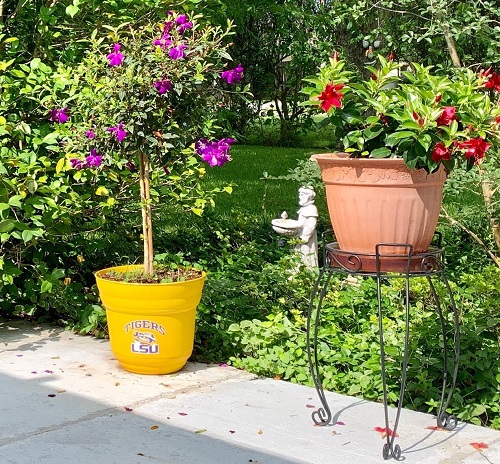
Anybody want to identify that ground cover plant for her? I see some variegated leaves. Its aggressiveness may be a clue.
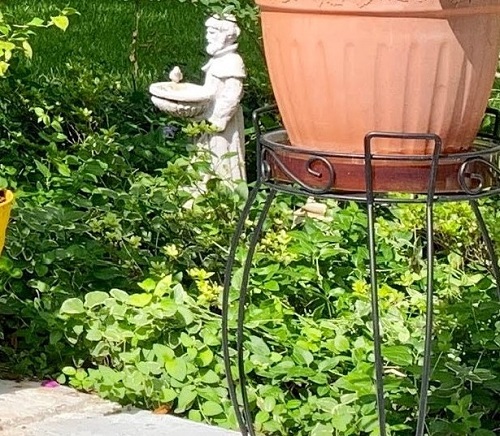
Then we have what we think is Confederate Jasmine growing on a lattice to give us some privacy from the street - and to the left, a Shrimp Plant. I understand hummingbirds like these Shrimp Plants.

Here's a photo of a female hummingbird from Jake Holenhead, with her tongue out. Ready to meet a shrimp plant. Hummingbird tongues are very unusual.
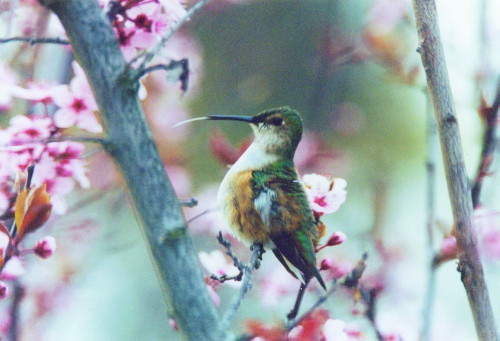
BTW - the patio is a haven for some wildlife - a mockingbird had a nest and young 'uns in that vine on the lattice behind the bench.Lizards have a habit of flying out of the various growing things and landing on whoever might be sitting outside, LOL.
All sorts of birds flock to the birdbath at different times of the day.
And our garter snakes like to sun themselves along the top of that vine on the lattice between the patio and the street. I've seen 4 at a time along there.
Sounds fun. As long as they're just garter snakes.
And snakes eat lizards. Maybe the lizards would like a place of their own to sit so that they don't have to fly onto people. This is a photo by ByTor of a Western Fence Lizard (AKA Blue Belly Lizard).
The Western Fence lizard is a very common lizard in California. They can often be seen on logs and rocks sunning themselves and doing pushup displays. The Western Fence Lizard and Lyme diseaseIt has been discovered that when ticks carrying Lyme disease feed on the western fence lizard the bacteria that cause Lyme disease are killed. In areas where western fence lizards occur the incidents of Lyme disease are lower. There are often many ticks, near the ear, on the western Fence lizard.
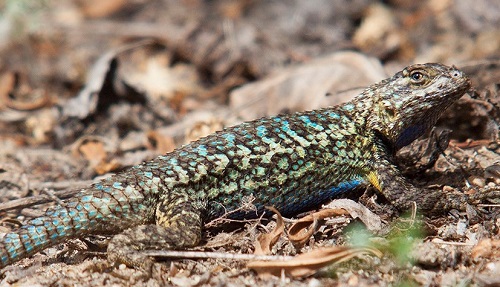
They are also found in some other Western states. Don't know if other lizards reduce the incidence of Lyme disease in that fashion.
More on the vines shown on the trellises above
Incidentally, Southern Living ran a little piece on Carolina Jessamine and Confederate Jasmine. Neither of these plants is a true Jasmine.
Native to the South and the state flower of South Carolina, Carolina jessamine (Gelsemium sempervirens) is commonly seen trained over doorways, bay windows, on walls and fences, and up lamp posts and mailboxes. In the wild, we spot its yellow blooms peeking down at us from tree branches. It climbs by twining its thin, pliable stems around something, so it needs a support. Unlike wisteria and some other vines, however, it won't crush the structure it's growing on.
I like the double-flowered one. Used to have one. I think it bloomed less profusely than the single, but over a longer time period. I think I would like the pale yellow one, too.
Le Vieux Garde prefers Wisteria. Even when it is climbing in (or bringing down) trees. Actually, I like Wisteria, too. In its place.
In California, they call "Confederate Jasmine" something else: "Star Jasmine". You know, Hollywood and all. Confederate Jasmine or Star Jasmine is more versatile than Carolina Jessamine because of its plant habit. It is frequently used as a ground cover. The treatment below is attractive, too. Carolina Jessamine would be hard to trim like this because it produces too many long streamers:

There is a somewhat smaller, hardier species of Star Jasmine that is also used in gardens. Trachleosperum asiaticum has smaller leaves and flowers. One cultivar has reddish new growth. The genus Trachleosperum is part of the Dogbane family, like Mandevillas. This brings us back to Mandevilla.
The hardier, fragrant Mandevilla
I have been intrigued by the idea of planting a Mandevilla laxa, or Chilean Jasmine.
Quite a different animal than the big pink Mandevillas people spend big bucks on to grow as annuals! This vine is much hardier (to 10 degrees F). It goes deciduous in the colder part of its range, but will stay fairly evergreen here by the Bay. Best of all, the WONDERFULLY FRAGRANT big white flowers, blooming from late Spring thru most of Summer and sometimes longer! An easygoing vine that doesn't get overwhelmingly big - 10-15', preferring regular water.
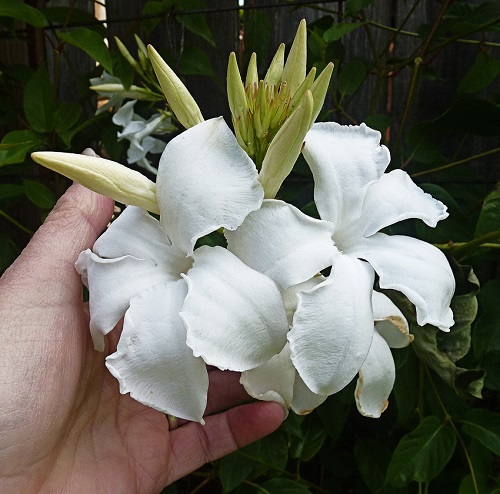
More on this under-used vine, sometimes called the vanilla bean vine.
The fragrance is variously described as being strong or not so strong and like gardenias or like vanilla. Don't use the seed pods like vanilla beans. They are probably toxic. There is likely to be some variation between seedlings in flower form and fragrance, so a clone is probably recommended if you want one that is predictable.
There's a named variety called 'White Star'. Recommended for hot summer areas.
It makes this list of uncommon garden fragrances. There are some interesting plants described there.
General Planting Advice
Bird Dog at Maggie's Farm recommends making a big hole for little plants. With amended soil in the hole. And timing planting to enhance survival of plants. Which sometimes means keeping notes until fall or spring on things you want to grow in the future. Some people now advise little amendment other than amendment of soil over the entire planting area.
I would amend the advice a little to note that sometimes larger specimens of perennials and such will survive transplanting in warmer weather where smaller plants would not survive. Also, you might want to actually unwind some roots on the root ball and hack into the sides of your hole so it isn't round. You don't want roots circling inside the hole you dig. Firm the soil down so you don't leave air pockets. Water well, immediately.
Surprise! Your vinegar weed killer is GMO. From Southern Living's Grumpy Gardener. Heh.
Last Week's Plant I.D. Challenges
I didn't do very well in my guesses for last week's photos. I thought that the yellow flower petals with the lipstick-red edges probably belonged to a tuberous begonia. Kind of like this one.
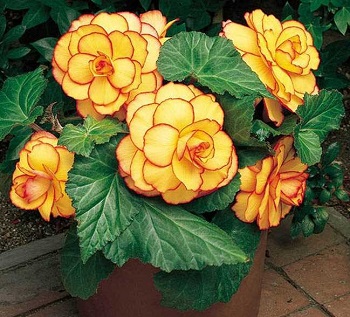
But they actually belonged to a tulip, as other members of The Horde correctly guessed. Here's another photo for confirmation.
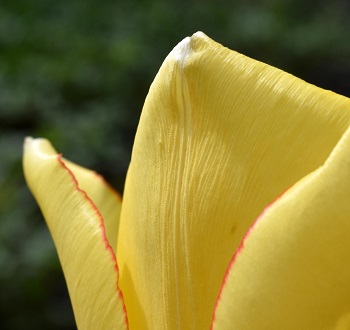
I also thought that the lilac-colored flower buds looked like they belonged to a member of the onion clan. But they were evidently, as The Horde correctly guessed, lilac buds.
I did think that the white blossoms with the reddish centers were members of the genus Prunus. Crisis du jour confirms that they grew on a tree rather than a bush, and that they were large for blossoms of that type, about the size of a half dollar. I think they were single flowering cherry blossoms. So if you click back to last week's post, you will see three different examples of flowering cherries.
I found a little piece from Japan explaining how to differentiate between the most common flowering cherries, plums and peaches when you visit there. Along with color,
The easiest way to spot the difference between a cherry, plum or peach flower is by observing the petal's natural shape. Cherry blossoms have a unique cleft at the tip of their petals which add to their pretty features and increasing popularity.Plum blossoms, on the other hand, have rounded petals while peach blossoms have tear-drop shaped petals.
Another easy way to tell the three beautiful blossoms apart is how they're attached to the tree.
* Cherry blossoms have long stems that attach them to the branch from a single bud.
* Plum blossoms grow out from the branch itself and literally have no stems.
* Peach blossoms have shorter stems which have two flowers sprouting from the same branch.
Our introductory photo of the day last week was a cluster of Farewell to Spring blossoms. Last year, we did a feature on this plant and its ornamental relatives in the genus Clarkia. It mentioned battleships, the Lewis and Clark Expedition and Brownian Motion. I thought the pot of fragrant little Clarkia breweri was charming. Never seen it in real life.
That post from last year also included some information on doubled cherries. This was also a problem with the early California cherries this year. Must have gotten hot last summer. Heh.
Sweet Cherries and related fruits
Since we brought up cherries, Gentlemen, this is democracy manifest has been trying to grow sweet cherries in Japan. Not easy. They are very expensive there. Here are some of the new commercial cherry varieties being offered for the Pacific Northwest. And cherries suitable elsewhere.
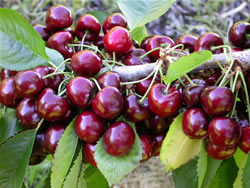
They are even doing new cherry breeding in Hungary. Lots of studies and work on cherries going on around the world, in fact.
Have you ever grown cherries, either sweet or sour? How did it go? Maybe we should discuss fruit trees a little more.
Some fruiting peaches have blossoms almost as showy as flowering peaches. Strictly flowering peaches are sometimes pruned like giant bouquets rather than like trees. Anybody interested in them?
Hope you get a chance to retreat from the world for a while in the garden this weekend. Not necessarily like this, compliment of redc1c4 IRL. Weather O.K.?
If you would like to send information and/or photos for the Saturday Gardening Thread, the address is:
ktinthegarden
at g mail dot com
Include your nic unless you want to remain a lurker.
The Grateful - Acta Non Verba: "It's my favorite medium. I don't paint, but I draw ..."
Warai-otoko: ""... and my first act as acting president in warti ..."
Aetius451AD work phone: "We are like the telegraph operators in Halifax, de ..."
TRex - revolving dino: "Thanks for being here. Lots going on today/tonigh ..."
Yudhishthira's Dice: "Iran, not having a nuclear weapon is not in the be ..."
eleven: "I mean...this Danish Princess... Is she hot? ..."
Romeo13: "Posted by: whig at February 28, 2026 07:23 PM (E4r ..."
eleven: ""I'm not the first to think of it, but he could ma ..."
Pug Mahon, aka Agent Frank: "Posted by: JTB at February 28, 2026 07:25 PM (yTvN ..."
Wolfus Aurelius, Dreaming of Elsewhere [/i] [/b] [/s]: "[i]I assume that at 1500 comments the blog will es ..."
Ian S.: "[I]BREAKING: Iranian First Vice President Aref has ..."
Hobby Thread - February 28, 2026 [TRex]
Ace of Spades Pet Thread, February 28
Nazis, RINOs, Islamofascists, and Other Infiltrators Who Should Have Been Purged Long Ago Are Having a Bad Day
Gardening, Home and Nature Thread, Feb. 28
Reactions: All the Right Nazis and Islamic Apologists Is Losing Dey Shit
REPORTS: THE AYATOLLAH HAS BEEN KILLED
The Classical Saturday Morning Coffee Break & Prayer Revival
The US and Israel Have Launched Military Strikes to Take out the Iranian Government
Daily Tech News 28 February 2026
Paul Anka Haiku Contest Announcement
Integrity SAT's: Entrance Exam for Paul Anka's Band
AllahPundit's Paul Anka 45's Collection
AnkaPundit: Paul Anka Takes Over the Site for a Weekend (Continues through to Monday's postings)
George Bush Slices Don Rumsfeld Like an F*ckin' Hammer
Democratic Forays into Erotica
New Shows On Gore's DNC/MTV Network
Nicknames for Potatoes, By People Who Really Hate Potatoes
Star Wars Euphemisms for Self-Abuse
Signs You're at an Iraqi "Wedding Party"
Signs Your Clown Has Gone Bad
Signs That You, Geroge Michael, Should Probably Just Give It Up
Signs of Hip-Hop Influence on John Kerry
NYT Headlines Spinning Bush's Jobs Boom
Things People Are More Likely to Say Than "Did You Hear What Al Franken Said Yesterday?"
Signs that Paul Krugman Has Lost His Frickin' Mind
All-Time Best NBA Players, According to Senator Robert Byrd
Other Bad Things About the Jews, According to the Koran
Signs That David Letterman Just Doesn't Care Anymore
Examples of Bob Kerrey's Insufferable Racial Jackassery
Signs Andy Rooney Is Going Senile
Other Judgments Dick Clarke Made About Condi Rice Based on Her Appearance
Collective Names for Groups of People
John Kerry's Other Vietnam Super-Pets
Cool Things About the XM8 Assault Rifle
Media-Approved Facts About the Democrat Spy
Changes to Make Christianity More "Inclusive"
Secret John Kerry Senatorial Accomplishments
John Edwards Campaign Excuses
John Kerry Pick-Up Lines
Changes Liberal Senator George Michell Will Make at Disney
Torments in Dog-Hell
The Ace of Spades HQ Sex-for-Money Skankathon
A D&D Guide to the Democratic Candidates
Margaret Cho: Just Not Funny
More Margaret Cho Abuse
Margaret Cho: Still Not Funny
Iraqi Prisoner Claims He Was Raped... By Woman
Wonkette Announces "Morning Zoo" Format
John Kerry's "Plan" Causes Surrender of Moqtada al-Sadr's Militia
World Muslim Leaders Apologize for Nick Berg's Beheading
Michael Moore Goes on Lunchtime Manhattan Death-Spree
Milestone: Oliver Willis Posts 400th "Fake News Article" Referencing Britney Spears
Liberal Economists Rue a "New Decade of Greed"
Artificial Insouciance: Maureen Dowd's Word Processor Revolts Against Her Numbing Imbecility
Intelligence Officials Eye Blogs for Tips
They Done Found Us Out, Cletus: Intrepid Internet Detective Figures Out Our Master Plan
Shock: Josh Marshall Almost Mentions Sarin Discovery in Iraq
Leather-Clad Biker Freaks Terrorize Australian Town
When Clinton Was President, Torture Was Cool
What Wonkette Means When She Explains What Tina Brown Means
Wonkette's Stand-Up Act
Wankette HQ Gay-Rumors Du Jour
Here's What's Bugging Me: Goose and Slider
My Own Micah Wright Style Confession of Dishonesty
Outraged "Conservatives" React to the FMA
An On-Line Impression of Dennis Miller Having Sex with a Kodiak Bear
The Story the Rightwing Media Refuses to Report!
Our Lunch with David "Glengarry Glen Ross" Mamet
The House of Love: Paul Krugman
A Michael Moore Mystery (TM)
The Dowd-O-Matic!
Liberal Consistency and Other Myths
Kepler's Laws of Liberal Media Bias
John Kerry-- The Splunge! Candidate
"Divisive" Politics & "Attacks on Patriotism" (very long)
The Donkey ("The Raven" parody)

